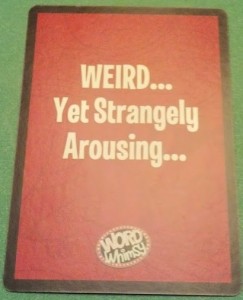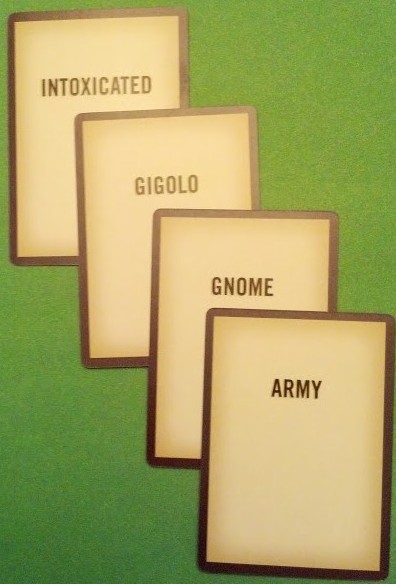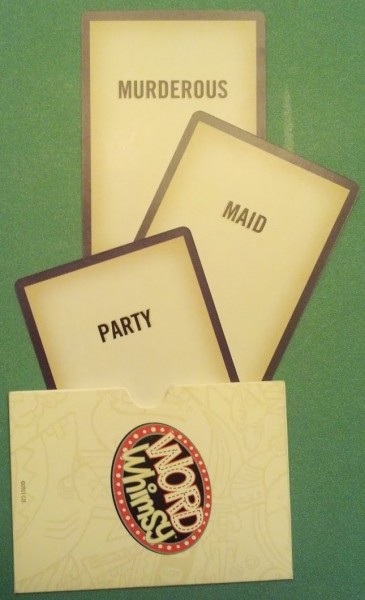“Just when you thought that the world was safe, along came a horde of ___”
A. Angry Overlord Leprechauns?
B. Dancing Robot Grandmas?
or
C. Lonely Alien Cows?
The Premise
Players are out to create the funniest answers possible, for points and glory. The goal is evident: submit the most ridiculous, bizarre, and amusing card combinations each round to earn the most points. When the dust settles, players will find out who the most creative (or twisted) wordsmith is.
The Rules:

Let the Games Begin!
Like many games in its caliber, Word Whimsy is very simple to set up. There are two decks of cards: Grey and Red. The Grey deck is Word cards, being largely nouns or adjectives, such as ‘Hippopotamus’ or ‘Funky’. About a third of these cards have a two words listed, and the player chooses which they prefer to use. Red cards are called Prompt cards. These are questions or statements that will require player responses, like “I would like my name to be Emperor __”, or “Perfect name for a metal band”. Players each receive a card envelope and draw a starting hand of seven Word cards.
In addition to these decks are twelve stacks of point chips, valued 1-5. One set of these chips will be used each round. The player with the largest mouth starts the game (whichever way one wants to interpret that). They will be the first judge. That player reveals the first Prompt card and reads it aloud. The other players choose any number of Word cards from their hand to form a phrase (however their twisted mind wishes), and places them, in order, in the card envelope.
The judge then collects the envelopes and reads the answers provided. Based on the judge’s own warped sense of humor, they will choose the answer they like best, and that submission is awarded the 5-point chip. The second best answer receives the 4-point chip, and so on. Each player will then draw back up to seven cards, and the next player becomes the judge. At the end of twelve rounds, players count up their point chip totals to determine the winner
Design Space Left, Apparently
Party games are not easy to create if you want them to stand out. Really. True, making a generic party game takes little development compared to other games. To make it have lasting appeal though, you need to create a game that can support a lot of players, is easy to learn as to include people who may not play games all that often (or at all), creates the desire to want to play again, and above all, stands out as memorable among all the other party games on the shelf.
So, how does Word Whimsy fare? Better than many, actually.
Word Whimsy is a card-based party game based around raucous answers. However, it’s difficult to carve out new territory in an area when you have to contend with established heavy hitters like Apples to Apples or Cards Against Humanity. Yet it manages to stake its claim to relevance because of four factors:
- It finds a happy middle ground between the heavyweights: Apples to Apples is largely a family-friendly game (although it shot up in prominence because adults started playing it on a much more mature level.) Cards Against Humanity approaches the theme from the other extreme: while appealing to some for its shock value nature, it’s not a game you play in polite company. At all. If they were movies, one is a strong PG and the other is a healthy NC-17.Word Whimsy surprisingly found available space in the middle. It has a healthy mix of general and adult Word cards, so while it may be inappropriate for a 14-year old, just about anyone else can play without being offended or grossed out. Much.
-
There is replay value: Part of the fun with these games people’s reactions to cards as they’re seen or the shock value as players experience them for the first time. Yet the longer you play, the more they run their course. There’s only so many times you can giggle at Apples’ use of Hellen Keller, for instance. Once cards are reshuffled and reused, they start to lose some luster.
Because Word Whimsy is about creating phrases rather than simple words, however, you’re always creating new card combinations. Getting the same Word card in a later game is not an issue, since the cards you pair with it are bound to change. This increases the game’s shelf life drastically.
- Being runner-up can still win the game: Games, at their core, are mostly about having fun. Social games doubly so. What’s not fun, however, is routinely coming in second. In games like Apples or Cards Against Humanity, no matter the number of players at the table, there can only be one victor per round. There is no silver medal. If you’re the person that perpetually has the next-best answer, it can make for a frustrating night.With Word Whimsy though, you have hope. Instead of just one winner, judges award points to entries (4 or 5, depending on players). This allows players to win the game who may not make the top spot continually but still consistently place well. It’s also a relief for the judge – in these games there’s often several really good answers, and it can be difficult to choose just one winner.
- There are set rounds, even with larger groups. One of the issues that arises with similar games is that it either takes a long time for someone to win, or there is no definitive end. Having a set twelve rounds makes for game sessions that are highly enjoyable but never feels like it drags. If the twelve rounds are too short, simply stack up the chips and start over.
A Moment For Pause
While there are a lot of positives with Word Whimsy, it does have two minor drawbacks. First is the three-sided card envelopes. The game allows players to contribute their entire seven card hand if they want, but even once they’re broken in, the envelopes don’t hold more than three or four easily. We recommend correcting this simply by cutting the top side open. This way the envelope can expand with bigger submissions while still holding the cards in place.
Second is the other is the number of players. Unlike other games in its class, Word Whimsy only officially supports up to 7 players. It can scale to 8 without an issue, but if you wish to include slightly larger groups you’ll need to get creative in using alternatives to the envelopes entirely, such as paperclips.
My Dancing Lobster Nurse
As previously mentioned, Word Whimsy is firmly a Party Game. Therefore, it’ll be right in the comfort zone of Socializers. Just like its contemporaries, it’s a game that’s light on rules and its emphasis is on having fun. Daredevils will also enjoy it due to the seemingly endless card combinations and the ability to share their zany phrases with others. However, since Word Whimsy – like most party games – lack a lot of depth or meaningful goals, Architects, Immersionists and Strikers may find the game isn’t quite up to their tastes.
That said, while there is only one viable “strategy” – holding cards for the right combinations and tailoring submissions to the judge – the subset of Tacticians who enjoy reading other players will be be satiated with that option even if it lacks a grand reveal or major flourish.
The Takeaway
Word Whimsy is a light, fairly quick game that has all the necessary components for hysterics. It doesn’t reinvent the wheel, but it also proves that it doesn’t have to. Instead, it manages to find a healthy medium between two other well-known games of a similar nature and adds its own spin. Word Whimsy is for those who strive for just a bit of structure to card-based phrase games. It lets players be creative with their submissions, and the ability to submit them in whatever quantity they want makes for games that are as memorable as they are hilarious. Whether you’re dealing with a Legendary Midget Ninja or Hungry Fire-Breathing Puppies, your options are only as limited as the question being asked. If you’re looking for a good social game addition to your collection, this one shouldn’t disappoint.
Cardboard Republic Snapshot Scoring (Based on scale of 5):
Artwork: N/A
Rules Clarity: 5
Replay Value: 4
Physical Quality 3.5
Overall Score: 4


